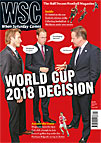 John Duerden covers the growth of the Asian Champions League, currently held by Seongnam Ilhwa Chunma thanks to their manager known as “the Korean Mourinho”
John Duerden covers the growth of the Asian Champions League, currently held by Seongnam Ilhwa Chunma thanks to their manager known as “the Korean Mourinho”
If José Mourinho was still manager of Inter he would be in with a chance of meeting his eastern equivalent at December’s FIFA Club World Cup in Abu Dhabi. The Italian club are likely to play the newly crowned champions of Asia, Seongnam Ilhwa Chunma, who are led by Shin Tae-Yong, aka “the Korean Mourinho”.
After the K-League club defeated Iran’s Zob Ahan 3-1 in the Asian Champions League final in Tokyo in November, Shin, just 40, said: “I admit I was quite arrogant and condescending as a player. But now as a manager, I’m champion of Asia, so I must be pretty great after all.”
He certainly had a great run in the competition. Seongnam, Korea’s most successful league team, defeated highly rated opposition from China (in nine Sino-Korean meetings, all went the way of Korea), Japan, Australia, Korea, Saudi Arabia and, finally, Iran on the way to the prize, the fifth successive East Asian triumph.
Japan and especially Korea – all four of the nation’s representatives made it to the last eight – have dominated the Asian Champions League of late. The tournament was revamped in 2003 to resemble the European version and these days 32 teams start out, though only ten nations get automatic representation.
Slots are not awarded based on performances on the pitch, as with UEFA coefficients, but on a whole host of criteria off it. These include: “government inappropriate intervention to the league management”; the accurate measuring and announcing of attendances; and the presence of a full-time league CEO.
Japan, Korea, Iran (where government certainly does intervene in league management), China and Saudi Arabia are the five countries with four spots each. As well as the increase in professionalism, the 2008 rise in prize money – from a total pool of $4 million (£2.6m) to $20m – moved the competition to the next level. Qualification to the Club World Cup doesn’t do any harm either.
Things were very different as recently as 2006 when Korea’s Jeonbuk Motors wanted to withdraw from the competition because of the travel costs, now covered by the Asian Football Confederation (AFC), and only stayed on because the fine for leaving was greater. Jeonbuk went on to win the tournament. There are still problems, but that is to be expected on a continent with wildly varying standards, both on and off the pitch. In 2009, UAE club Sharjah withdrew from the group stage – the team had no hope of progressing – to focus on their fight against relegation. Strict new rules have since been put in place to ensure there is no repeat.
Despite that the Asian Champions League is seen as more prestigious, and receives greater media attention, than ever before. At the final at the National Stadium, most of the noise came from the Seongnam followers. The team took thousands of fans, probably more than any other non-Japanese team would manage. Many, however, were Japanese and the reason they spent a mild Saturday evening making their way to downtown Tokyo was because of something not covered by the AFC’s criteria – religion.
Seongnam are owned by the Unification Church, the followers of which are perhaps better known as the Moonies. Though perhaps not quite as newsworthy now as in the 1970s and 1980s, the mass weddings still continue – 7,200 couples were wed or reaffirmed vows in the South Korean city of Ansan on October 10. The founder, Reverend Sun Myong-Moon, is now 90 but was sprightly enough to perform the ceremony.
Like the church, he is also very rich, so much so that there was a wild rumour during the 1997 Asian financial crisis that Sun offered to pay off Korea’s growing debt in return for official state religion status. The debts that Seognam run up are much smaller, but the club are able to operate at a loss thanks to their owners. The church also bankrolls the signing of high-quality foreign stars (players don’t have to be part of the church and the club doesn’t advertise its religious connections), such as the Asian Player of the Year Sasa Ognenovski, former Partizan Belgrade striker Dzenan Radoncic and the talented Mauricio Molina from Colombia.
Add to that the fact that internationals Kim Jung-Woo and Choi Sung-Kuk missed virtually the whole season – they were finishing their conscription period with the military team Gwangju Sangmu – but will play in Abu Dhabi, then you can see why the Koreans are optimistic of ending a very good year on a high. If they do, their “Special One” will get a chance to tell the world and not just a continent how great he is.
From WSC 287 January 2011